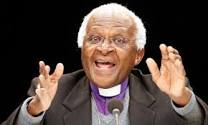|
Tutu's parents were from the Xhosa and Tswana tribes in South Africa. His father taught at a mission school which Tutu attended. Though he wanted to become a doctor, his family was unable to afford sending him to medical school. Instead, Tutu became a schoolteacher in 1954. After teaching for three years, Tutu resigned out of protest over South African government's educational policies towards Black South Africans. At the time, South Africa was a racially stratified society that heavily discriminated against Black South Africans. This rigid system, known as apartheid, denied Black Africans many of the same rights and privileges afforded White South Africans, such as education, jobs, and basic civil rights.
Tutu decided to to become a priest and was ordained an Anglican priest in 1961. After teaching at the seminary in Johannesburg, Tutu studied in London, England, where he received an M.A. In 1978, he was appointed the first Black general secretary of the African Council of Churches and began to speak out for the rights of Black South Africans. In his speeches, Tutu expressed his support for non-violent protests against apartheid and encouraged other countries to boycott South African products. In addition, Tutu published books that were compilations of his sermons and lectures.
In 1984, Tutu received the Nobel Peace Prize for leading the nonviolent struggle against apartheid. The same year, he was appointed Johannesburg's first Black Anglican bishop. In 1986, Tutu was elected the archbishop of Cape Town and became the head of the Anglican church in South Africa. In the 1990s, Tutu's dream was finally realized as South Africa repealed apartheid and elected its first Black president, Nelson Mandela.
|

|
Comments (0)
You don't have permission to comment on this page.